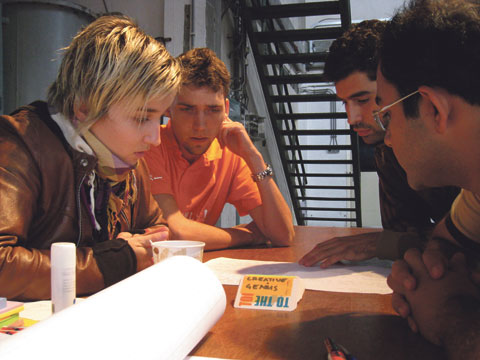Past efforts to integrate TU Delft’s Dutch and international students have largely failed. The Faculty of Industrial Design Engineering (IDE) however tried a new approach this year that seems to have worked, resulting in a greater sense of group cohesion among all the faculty’s new MSc students.
A recent study by the student political party Oras found that the integration of Dutch and international students is still lagging behind. “Students at TU Delft do not live and work in an international community,” the study concluded. “Dutch students at TU Delft have little or nothing to do with the TU’s international students, let alone Dutch students having friends among the internationals.”
Problematic, but then contemporary European societal dynamics show that the integration process for ethnic minorities generally takes time, as indeed is the case for TU Delft’s integration process. Yet there is a real sense of urgency for improving the TU’s integration process, for without doing so, not only do international students enjoy there time here less, but the learning processes within faculties can suffer as well.
Aware of this, the Faculty of Industrial Design Engineering (IDE) organized a special ‘2008 Master Kick-Off Event’ in early September. Both the participants and organizers were extremely pleased with the results: over the course of the day a real sense of group cohesion developed.
According to Lenneke Kuijer, the former head of IDE’s International Office who organized the event, the most important reason for the event’s success was that they did not specifically set out to promote integration per se. Rather, promoting integration between Dutch and international students is simply part of IDE’s broader objective of creating a greater sense of community among its students
Kuijer: “The Master Kick-off Event’s objective was primarily intended to create a group feeling among all MSc students, whether they were our own former BSc students, students from other Dutch universities, or students from abroad.”
The kick-off event was held at the ‘Lijm&Cultuur’ factory, a former gelatin production factory that has been converted into a trendy, cultural hotspot in Delft. Massimiliano Marass, an MSc student from Italy, applauded the “excellent decision” to host the event off-campus: “I had the impression that a sort of common identity was developing, and exactly because we were isolated from the rest of the university and had to spend the whole day together.”
During the day, new MSc students received information about the faculty’s programs, professors and compulsory courses, as well as information about the do’s and don’ts in teamwork, which also served as input for a game assignment. “We had to design a game that allowed teamwork processes to be evaluated,” says Nathalie Stembert, from The Netherlands. “And this was funny because while we were carrying out the assignment we were also focusing on how our team functioned.” The ‘2008 Master Kick-Off Event’ then concluded with an after-party and ‘borrel’.
Cultural boxes
For the most students – whether Dutch or international – getting to know people of the same nationality or ethnic identity is relatively easy. Kuijer admits that for many people, working in heterogeneous teams is quite challenging. She says approaching each other without prejudice is fundamental for success in such teams: “An open mindset enables team members to prevent problems or at least manage them. And there is also a real incentive for all students to cooperate as best they can in diverse teams, because studies show that diverse teams generally attain better, more creative solutions.” For the IDE faculty however the goal of teaming up people from different nationalities goes beyond merely promoting integration and preparing students for MSc programs. Kuijer: “The graduates we deliver often have to work in heterogeneous and international teams. By stimulating diversity, we’re trying to prepare them as best we can for their future careers.”
Kuijer believes that, rather paradoxically, the past failures of promoting integration between Dutch and international students is perhaps due to the specific focus on culture differences: “When you start pointing out the ‘foreigners’ and the ‘Dutch’, an atmosphere of putting each other in cultural boxes is created.”
The consequences of thinking in cultural boxes are of course negative. “Such an atmosphere can lead to situations in which the ‘Dutch’ start explaining to the ‘foreigners’ how ‘we’ do things here,” Kuijer says. And from such a patronizing ‘host-guest’ scenario, no real, meaningful interaction between Dutch and international students is ever likely to occur.
Such kick-off events are typically organized for all first-year BSc students and have a long tradition in Dutch higher education – this year marked the 25th anniversary of TU Delft’s OWEE program, for example.
This IDE event however was a kick-off for only new MSc students, and Kuijer stresses that it’s important that BSc and MSc group-building programs are kept separate. Given the fact that most international students desperately want to integrate with the TU Delft’s Dutch community, other TU Delft faculties could do well to host similar kick-off events of their own in future.
Italian MSc student Massimiliano Marass certainly feels that being denied an opportunity to integrate with TU Delft’s Dutch students would result in an “incomplete experience”. He also firmly believes that integration benefits both Dutch and international students equally: “Sharing experiences is one of the best ways to increase your expertise and learn about the world around you. And who knows, you might even make new friends!”



Comments are closed.